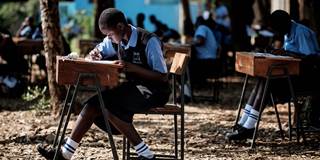
The Asset We Cannot Afford to Neglect
Improving education outcomes will demand national-level reforms underpinned by a relentless focus on quality, equity, and results. But, at a time of fiscal austerity in donor countries, the International Finance Facility for Education's promise to stretch donor dollars further could not be more important.
LONDON – “An investment in knowledge pays the best interest,” wrote Benjamin Franklin. A fervent advocate for public education, and a founder of libraries, schools, and the University of Pennsylvania, Franklin viewed education as the foundation of human progress. If he were alive today, he would be horrified by the state of education in developing countries – and he would most likely be backing the International Finance Facility for Education (IFFEd) proposed by the International Commission on Financing Global Education Opportunity, led by former British Prime Minister Gordon Brown.